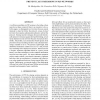Free Online Productivity Tools
i2Speak
i2Symbol
i2OCR
iTex2Img
iWeb2Print
iWeb2Shot
i2Type
iPdf2Split
iPdf2Merge
i2Bopomofo
i2Arabic
i2Style
i2Image
i2PDF
iLatex2Rtf
Sci2ools
103
click to vote
IPPS
2009
IEEE
2009
IEEE
BarterCast: A practical approach to prevent lazy freeriding in P2P networks
A well-known problem in P2P systems is freeriding, where users do not share content if there is no incentive to do so. In this paper, we distinguish lazy freeriders that are merely reluctant to share but follow the protocol, versus die-hard freeriders that employ sophisticated methods to subvert the protocol. Existing incentive designs often provide theoretically attractive resistance against die-hard freeriding, yet are rarely deployed in real networks because of practical infeasibility. Meanwhile, real communities benefit greatly from prevention of lazy freeriding, but have only centralized technology available to do so. We present a lightweight, fully distributed mechanism called BARTERCAST that prevents lazy freeriding and is deployed in practice. BarterCast uses a maxflow reputation algorithm based on a peer’s private history of its data exchanges as well as indirect information received from other peers. We assess different reputation policies under realistic, trace-based co...
Die-hard Freeriding | Distributed And Parallel Computing | IPPS 2009 | Lazy Freeriding | Versus Die-hard Freeriders |
| Added | 24 May 2010 |
| Updated | 24 May 2010 |
| Type | Conference |
| Year | 2009 |
| Where | IPPS |
| Authors | Michel Meulpolder, Johan A. Pouwelse, Dick H. J. Epema, Henk J. Sips |
Comments (0)

